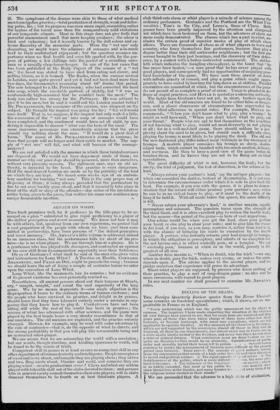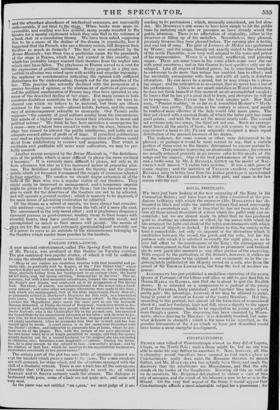DECLINE OF THE DRAMA.
THE Foreign Quarterly Review quotes from the Revue Musicale some remarks on theatrical speculations ; which, it shows, are as un- profitable in France as in England. ` Every undertaking which has the public amusement for its object is ruinous. The inquiries I have made respecting the situation of the theatres all over Europe have proved to me, that for more than one hundred and titty years past, all those who have taken charge of them have either lost their fortunes, or become bankrupt, with some rare exceptions, which are not applicable to operatic theatres. At this moment all the theatres in Germany, which are not supported by the sovereigns, almost all those in Italy and in England, all those in our departments, and almost every one in Paris—are In a state nearly similar to that of the Feydeau, and never was there known such a state of general distress. What conclusion must we draw ?—that we re- quire no theatres ?—This would be an absurdity. Considerations of public order and morality forbid their being left to perish. . . . Several causes combine to render the management of theatres more difficult at the present period than formerly. These are—I. The scarcity of good authors, arising from the circumstance that minds of a high order havo turned their attention to moral and political science. 2. The equal scarcity uf g.,od actors. 3. 'fhe fastidiousness of the public, which is more difficult 1.. ]'. ase, the more c!v!- lized it becomes. -I. The influence of the Con.or(;gai: . ,iii society ; which is so widely extended, that most of the- public fin. • • .] :ries scarcely dare show themselves at the theatre, and many females are .•:..1cd away from it by the religious terror excited in their minds." We are persuaded that the advance to a high state of civilization, ) and the attendant abundance of intellectual resources, are necessarily unfavourable, if not fatal to the_stw:) When books were more in- accessible, and reading was less general, many people resorted to the theatre for a mental excitement which they now find in the volumes of a book club or a circulating library. We have been asked, supposing this to be a cause of the decline of the drama in popularity, how it happened that the French, who are a literary nation, still frequent their theatres as much as formerly? The fact is now negatived by the Revue Musicale; but there was a particular cause for the popularity of the stage in France, which has not existed in this country, and which has probably longer rescued their theatres from the neglect into which ours have fallen. The playhouse in France served as a vent for the expression of political sentiment. Every passage in a play con- vertible to allusion was seized upon with avidity and singular ingenuity; the applause or condemnation indicating the opinion with sufficient distinctness for the understanding, though not for the penalties of the law. This practice has naturally declined with the possession of a greater freedom of opinion, or the abatement of matters of grievance ; and the political amelioration of France may thus have operated as one cause of the described decline of her stage. But many causes in both countries doubtless contribute to the effect in question : we have in- stanced one which we believe to be material, but there are others assistant to the same result—altered habits, fashion, and the conspi- racy of mismanagement referable- to monopoly. Our French critic supposes "the scarcity of good authors arising from the circumstance that minds of a higher order have turned their attention to moral and political science." We think he has here mistaken a consequence for a cause—men of talent have ceased to write for the stage, because the stage has ceased to interest the public intelligence, and holds out no adequate reward either of profit or of fame. If periodical publications were read as playhouses are visited, the superior class of authors would desist from contributing to reviews and magazines. That which is creditable and profitable will never want cultivators, we may be per- fectly assured. Another reason assigned by the Revue Musicale is, "the fastidious- ness of the public, which is more difficult to please the more civilized
it becomes." It is certainly more difficult to please, not only as its taste advances, but also as it has increased means of procuring plea- . sure. The fastidious public then desert the theatre, and the grosser public which yet frequent it command the supply of grossness adapted to their appetites„: We confess we should augur extremely ill of the
taite-Ortliiinan who was a regular visitor of our theatres. They might easily be improved in management, and a temporary impulse
might be given to the public taste for them ; but the reasons we ima- gine to exist for the desertion of the theatres are not to be affected, and will operate a general neglect ; which is scarcely to be deplored, if the main cause of advancing civilization be admitted.
Of the drama as a school of morals, we have always had consider- ' able mistrust—nay, we confess we deem the talk of it a mere idle cant. The amusement is the only moral effect ; and if playhouses disgorge a thousand persons in good-humour, sending them to their homes with cheerful hearts, they have produced so 'far a desirable result, and accomplished as much as their means will permit. The morals of Clays are for _the. mostl)art extremely questionable, and certainly not „.. of a power to serve as an antidote to The circumstances belonging to the theatres which render them porches to the brothels.



















 Previous page
Previous page